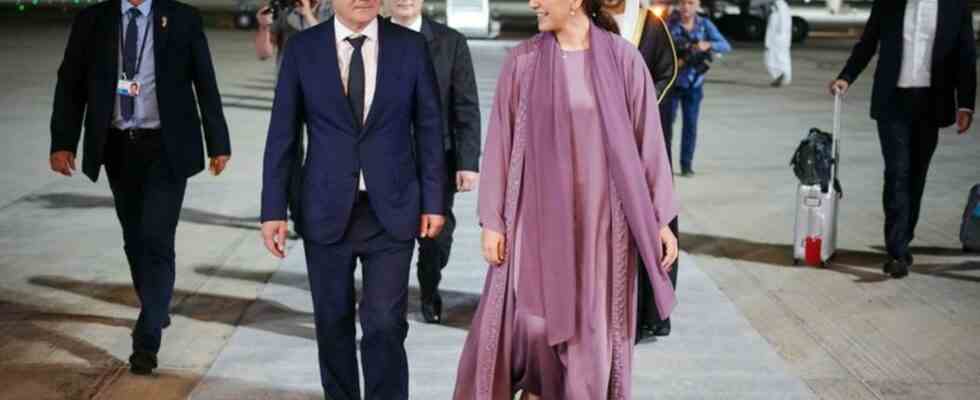Chancellor
Scholz is looking for energy partners in the Gulf
Chancellor Olaf Scholz (SPD) is received at Abu Dhabi Airport by the United Arab Emirates Minister for Climate Change and Environment, Mariam bint Mohammed Saeed Hareb Almheiri. photo
© Kay Nietfeld/dpa
In order to secure Germany’s energy supply, the federal government is active at home and abroad. Chancellor Scholz is looking for new partners in the Gulf region. At home, debates about instruments rage on.
In order to guarantee the energy supply in Germany, the federal government wants to expand cooperation with the Gulf States. Chancellor Olaf Scholz traveled to the Gulf region at the weekend. In the United Arab Emirates (UAE), the Essen-based energy group RWE signed a contract for the first delivery of liquefied natural gas (LNG) on Sunday. A memorandum on multi-year deliveries from 2023 was also signed. In Germany, the debate continues to rage on how the high energy prices can be cushioned for people and the economy. The planned gas levy is shaky now that Finance Minister Christian Linder (FDP) has questioned it.
Energy issues were the focus of the trip that took Scholz to Saudi Arabia, the UAE and Qatar at the weekend. On Sunday in Abu Dhabi, the Chancellor emphasized the importance of using as many providers as possible. Dependence on one supplier “will certainly not happen to us again,” he said, referring to Russia.
Gas allocation is in question
The gas levy, which is intended to support gas importers who have high costs for replacement purchases due to a lack of Russian deliveries, is increasingly being questioned. Economics Minister Robert Habeck (Greens) still sees questions of financial constitutional law to be clarified, now the Finance Minister is also casting doubt on the instrument. “It’s less a question of law when it comes to the gas levy, but more and more of a question of economic meaning,” Lindner told the “Bild am Sonntag”. Green leader Ricarda Lang said the gas surcharge could go away as soon as the Ministry of Finance was willing to come up with an alternative. “This alternative means: financing from budget funds,” said Lang.
Scholz held out the prospect of proposals to curb gas prices in the near future. A commission started consultations on Saturday. “We will also be able to count on quick results there,” said the Chancellor on Sunday in Qatar in the capital Doha. All factors should be considered together “so that citizens and companies are not faced with unsolvable tasks”. With a view to the efforts to ensure a broader supply of gas, he again emphasized that at the beginning of autumn one could say: “We’ll probably get through this winter.”
Gas price cap required
Green leader Lang spoke out in favor of capping gas prices for basic needs. Demands for price caps also came at the weekend from Bavaria’s Prime Minister Markus Söder (CSU), Lower Saxony’s Prime Minister Stephan Weil (SPD), the President of the German District Association, Reinhard Sager, and the head of the SME and Economic Union, Gitta Connemann (CDU).
The northern German states of Lower Saxony, Mecklenburg-Western Pomerania and Schleswig-Holstein have meanwhile spoken out in favor of dividing Germany into different price zones for electricity. According to “Welt am Sonntag”, the countries want to ensure more justice in electricity prices. The north has been bearing the brunt of the energy transition for years, it was said in justification. Söder countered the north with the state financial equalization system, into which Bavaria pays nine billion euros and thus supports the north German households.
The consumer day, an event organized by the consumer advice centers, also deals with the high energy prices on Monday. In a dpa interview, Federal Consumer Protection Minister Steffi Lemke (Greens) announced a legal regulation that would prevent electricity and gas cuts.
On Wednesday, the prime ministers of the federal states will then consult with Scholz. The coalition had presented a third relief package with an estimated volume of 65 billion euros. These include one-off payments for pensioners and students, a price cap for a basic electricity requirement and a contribution from the federal government for a follow-up offer of the 9-euro ticket for buses and trains in local transport. However, the financing of the measures is still being debated. Baden-Württemberg’s Prime Minister Winfried Kretschmann (Greens) and the chairman of the Prime Ministers’ Conference, Hendrik Wüst (CDU) from North Rhine-Westphalia, called for a fair distribution of the burden.

